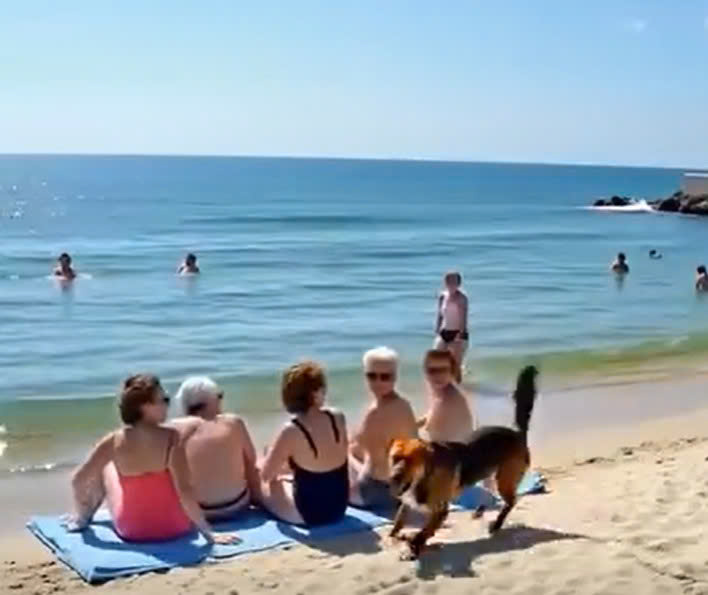The sun was warm, the waves were calm, and the soft breeze made everything feel peaceful as five long-time friends sat together on large beach blankets. It was one of those rare summer days when no one was rushing anywhere. They laughed, shared stories, and enjoyed homemade treats packed in a wicker basket—fresh fruit, cookies, and ice-cold drinks that tasted even better under the gentle sunlight. Every now and then, one of them would fall quiet, simply watching the horizon where the sea met the sky. It was shaping up to be the perfect afternoon.

Then, suddenly, everything changed.
Out of nowhere, a medium-sized mixed-breed dog ran toward them across the sand. His fur was slightly scruffy, his ears alert, and he barked loudly as he approached the group. At first, the women didn’t think much of it. A friendly beach dog wasn’t unusual, especially on a warm summer day.
“Look how adorable he is!” one of the friends laughed as she held out a cookie.
“He must be hungry,” another added, tossing a second treat in his direction.
But the dog ignored the food completely. Instead, he kept circling them, barking louder each time, his movements quick and restless. His tail wagged, but his behavior didn’t match the playful energy of a dog looking for snacks or affection. There was urgency in the way he moved, a frantic edge that made the women exchange confused looks.
Something wasn’t right.
One friend—the most observant of the group—suddenly froze. Her smile disappeared, and her face drained of color as she stared at the dog’s side.
“Girls… look at his fur,” she said, her voice barely above a whisper.
The others leaned in. At first, it was hard to see clearly under the bright sun, but then it became obvious: dark red stains were scattered across the dog’s fur, particularly along his side and his paws.
“Oh no… is he hurt?” one of the women asked, her voice trembling.
They looked more closely. The dog wasn’t limping. He wasn’t whining in pain. He didn’t behave like an injured animal at all. In fact, the longer they watched him, the more it seemed like he wanted their attention not for himself—but for something else.
Before any of them could react, the dog spun around and sprinted toward a rocky stretch near the water. He would run a few steps, stop, bark, and look back as though urging them to follow.
The women exchanged a quick glance. Whatever was going on, it was clear the dog needed them to come. They rose from their blankets and hurried after him, their feet sinking into the hot sand as they tried to keep up with his fast, determined strides.
As they reached the rocky cape, their hearts clenched.
Lying on the wet sand was an unconscious man. A dark patch beneath his head indicated he had suffered a serious injury, and the wet stone beside him glistened in the sun, suggesting he had slipped and struck his head. The waves reached dangerously close to him, pulling and retreating in a slow rhythm that made everything feel even more urgent.
The dog ran straight to him, whining softly before letting out another series of loud, sharp barks as if calling for help with everything he had.
One woman immediately dialed emergency services with shaking hands, explaining what they had found. Another knelt beside the man and hovered her hand near his mouth.
“He’s breathing… but just barely,” she said, her voice soft but steady with concern.
The group worked together as best they could. One shaded the man’s face from the sun. Another checked if he was responsive. A third kept her hand on the dog, who stayed close, trembling slightly but refusing to leave the man’s side.
Minutes felt like hours, but finally, the sound of an ambulance siren cut through the warm summer air. Paramedics rushed down the beach with equipment in hand. The women stepped back, watching anxiously as the medical team carefully assessed the man’s condition, secured him onto a stretcher, and began tending to his wound.
As the paramedics worked, the dog finally relaxed a little. His tail lowered, his breath steadied, and he walked toward one of the women. He gently nudged her hand with his nose, allowing her to stroke the top of his head.
“It’s like he’s thanking us,” she whispered.
But the women knew the truth: they were the ones who should be grateful—to a loyal animal who refused to give up until someone followed him.
Later, one of the paramedics returned to speak with the women. He told them the man would have likely been in critical danger had he remained undiscovered much longer. The tide was rising, and the next large wave could have swept him deeper into the water. The dog’s quick action—alerting someone, refusing to leave, guiding them across the sand—had very likely saved his life.
The story echoed among the friends long after that day. What began as a quiet beach outing had turned into a moment none of them would ever forget. It reminded them that animals often sense things humans overlook—and that sometimes, help arrives in the most unexpected form.
As they packed up their belongings, the dog stayed close until the very last moment. When the ambulance finally pulled away, siren silent but lights still flashing, the dog sat on the sand watching it disappear down the road.
Only then did he walk off slowly along the beach, as if his mission for the day had been completed.
And the women understood something they would never forget: sometimes a hero doesn’t look like what you expect. Sometimes, a hero has four paws, a beating heart full of loyalty, and a voice that never stops calling for help until someone finally listens.





